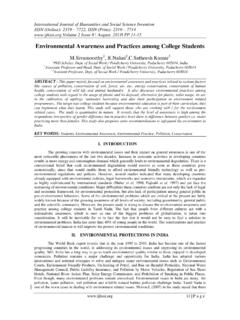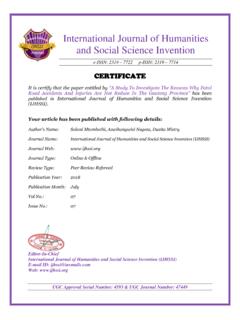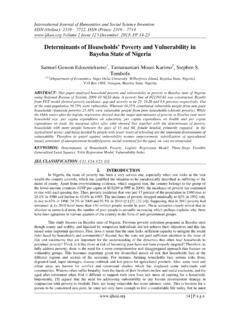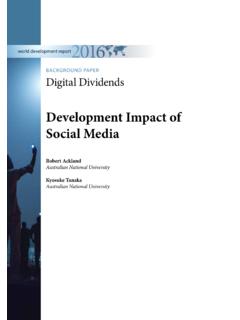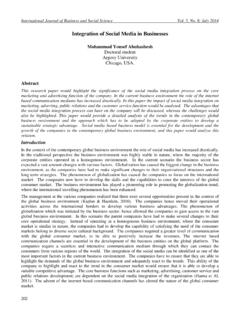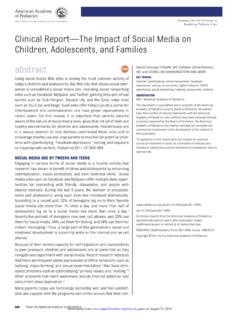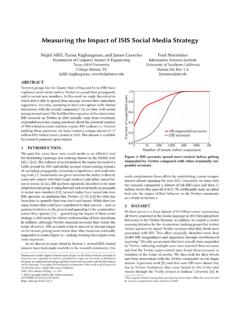Transcription of Impacts OF Media on Society: A Sociological Perspective.
1 International Journal of Humanities and social Science Invention ISSN (Online): 2319 7722, ISSN (Print): 2319 7714 Volume 3 Issue 6 June. 2014 56 | P a g e Impacts OF Media on society : A Sociological perspective . 1,Hakim Khalid Mehraj,2,Akhtar Neyaz Bhat ,3, Hakeem Rameez Mehraj Lecturer1, Baramulla ABSTRACT: Man is a social animal,he cannot live in isolation,so his actions affect not only him but society in general, society affects a man in so many ways. This paper gives a brief definition of what Media is and what are the effects of Media on society . During the course of this literature various types of Impacts of Media on the individual, his family and society are highlighted.
2 KEY WORDS : society , Media , Impacts of Media , Theories of Media , Communication theories etc I. INTRODUCTION: Human beings express their nature by creating and recreating an organization which guides and controls their behaviour in many ways. This organization liberates and limits the activities of men, sets up standards for them to follow and maintain. Whatever the imperfections and tyrannies it has exhibited in human history, it is necessary condition of fulfillment of life. This organization which is responsible for fulfillment of life of every individual is called society . Man in every society has suffered from one or the other problems.
3 Men in modern societies are also experiencing various problems and his behavior gets affected by many things, Media is one of them.: Media is the plural of the word medium. Media are the vehicles or channels which are used to convey information, entertainment, news, education, or promotional messages are disseminated. Media includes every broadcasting and narrowcasting medium such as television, radio, newspapers, billboards, mails, telephone, fax, internet etc (the main means of mass communication). The mass Media occupy a high proportion of our leisure time: people spend, on average, 25 hours per week watching television, and they also find time for radio, cinema, magazines and newspapers.
4 For children, watching television takes up a similar amount of time to that spent at school or with family and friends. While school, home and friends are all acknowledged as major socializing influences on children, a huge debate surrounds the possible effects of the mass Media and findings both in favour and against effects are controversial. The question of effects is typically raised with an urgency deriving from a public rather than an academic agenda and with a simplicity which is inappropriate to the complexity of the issue (we do not ask of other social influences, what is the effect of parents on children or do schools have an effect which generalizes to the home or do friends have positive or negative effects).
5 The possibility of Media effects is often seen to challenge individual respect and autonomy, as if a pro-effects view presumes the public to be a gullible mass, cultural dopes, vulnerable to an ideological hypodermic needle, and as if television was being proposed as the sole cause of a range of social behaviours. Such a stereotyped view of research tends to pose an equally stereotyped alternative view of creative and informed viewers making rational choices about what to see. Overview articles often describe a history of progress over the past seventy years of research which alternates between these two extremes -- first we believed in powerful effects, then came the argument for null effects, then the return to strong effects etc.
6 -- a history whose contradictions become apparent when old research is re-read with new eyes. Contemporary Media studies sometimes define itself through its rejection of the language of effects research -- criticising the laboratory experiment, the logic of causal inference, and psychological reductionism. S II. FUNCTIONS THE Media Mass Media is a tremendous source of information for individuals as well as society . We know a bit about the role of mass Media in a democracy. Let us now see how the Media perform their functions to bring about changes. III. MASS Media CAN HELP IN CHANGE Using mass Media , people s attitudes and habits can be changed.
7 For example all of us have mistaken or wrong notions about various diseases like leprosy or HIV/AIDS. Many of us think that by touching people suffering from these diseases we would be infected. You might have heard on radio or watch television programmes or read messages which tell us that by touching an HIV/AIDS patient we do not get infected. Similarly, for eradicating polio there are special programmes and messages disseminated through the Media . Impacts OF Media On 57 | P a g e They inform people about the need for giving polio drops to children and about the day that is declared a polioday.
8 Special arrangements are made to give polio drops to as many children as possible on polio day. Change would also mean things for the better. The concept of development of a country is again a matter of change, when old practices and equipment are changed and new, better and more efficient means are being used. Mass Media play an important role in communicating this change. By giving the necessary information, and sometimes skills, the Media can help bring about this change. You may ask how Media can impart skills. Mass Media like television can demonstrate and show how things work. You would have seen on television how a certain dish is cooked using modern kitchen equipment.
9 Mass Media have made the World Smaller and Closer :The speed of Media has resulted in bringing people across the world closer. Let us take an example. When you watch a cricket match between India and another country in England, Australia or New Zealand, live on television, you feel you are part of the crowd in that stadium. Events, happy or sad, happening anywhere can be seen live. Sometimes we feel that the entire world is one big family. You might have heard the term global village . It means that the whole world is shrinking and becoming a village. Wherever we go to any part of the world, we see the same products such as soft drinks, television, washing machine, refrigerator etc.
10 And the same type of advertisements. Similarly, the world wide web and internet have brought people and countries much closer. Mass Media Promotes Distribution of Goods : Mass Media are used by the consumer industry to inform people about their products and services through advertising. Without advertising, the public will not know about various products (ranging from soup to oil, television sets to cars) and services (banking, insurance, hospitals etc.) which are available in the market as well as their prices. Thus mass Media help the industries and consumers Entertainment and informative :Mass Media is one of the best means of recreation.
